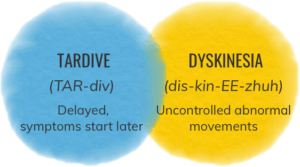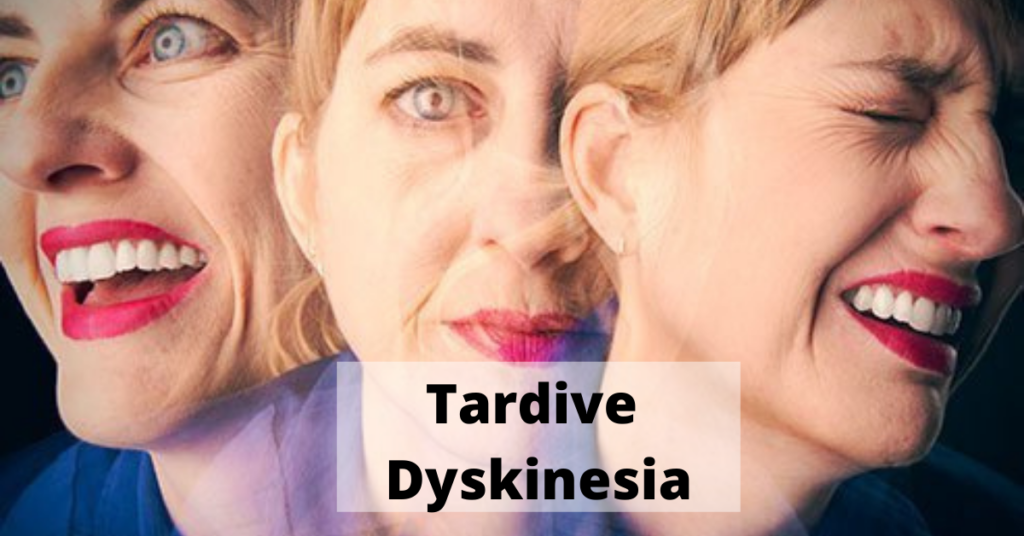Tardive dyskinesia (TD) is a neurological disorder that causes involuntary and repetitive movement. It’s also called tardive dystonia. This can be because of antipsychotic medication. TD is not the same as Parkinson’s disease, but the symptoms are similar to those of Parkinson’s. In this blog post, we’ll tell you all about TD: what it is, how to recognize it, and how to manage it so you can live your life without being confined to a chair or bed.
Contents
What Is Tardive Dyskinesia?
 Tardive dyskinesia (TD) is a neurological movement disorder that usually affects people who have been on certain types of medication for at least several months. TD causes uncontrolled movements, such as grimacing and lip-smacking, which can worsen over time. It tends to develop in adults more than children, but it’s possible for either age group to be affected. In rare cases, the longer someone has taken antipsychotics like haloperidol or risperidone without stopping them even if they’ve never had symptoms before, the higher their risk may be for developing tardive dyskinesia later on when they stop taking these medications after using them regularly for years.
Tardive dyskinesia (TD) is a neurological movement disorder that usually affects people who have been on certain types of medication for at least several months. TD causes uncontrolled movements, such as grimacing and lip-smacking, which can worsen over time. It tends to develop in adults more than children, but it’s possible for either age group to be affected. In rare cases, the longer someone has taken antipsychotics like haloperidol or risperidone without stopping them even if they’ve never had symptoms before, the higher their risk may be for developing tardive dyskinesia later on when they stop taking these medications after using them regularly for years.
Signs of Tardive Dyskinesia
There are many signs of TD, but the most common are facial grimaces and lip-smacking. Other signs can include:

- head-bobbing or shaking
- jerking of the arms, legs, or trunk
- squirming movements
- rubbing or wringing of hands
- changes in posture, such as leaning to one side
Common Causes of Tardive Dyskinesia

There are some causes of tardive dyskinesia that are the same as those of other types of involuntary movement disorders, such as Huntington’s disease or Parkinson’s disease. These causes include:
- certain medications for certain mental health conditions
- mental illnesses themselves (such as schizophrenia)
- drugs to treat nausea and vomiting during pregnancy can also cause TD in some cases; this is rare though
How to Manage Tardive Dyskinesia?
There is no one-size-fits-all answer for managing tardive dyskinesia, as the approach will vary depending on the person’s individual situation and symptoms. However, some tips for managing TD include:
- if you’re taking medications that may cause TD, talk to your doctor about whether there are lower-risk alternatives available
- try to take breaks from any antipsychotic medications if possible; this should only be done under a doctor’s supervision, however
- exercise regularly; exercise has been shown to help improve movement in people with Parkinson’s disease and may also help those with TD
- practice relaxation techniques or yoga; these can help reduce stress levels and tension that may worsen involuntary movements
- write down your symptoms in a diary to help you track how they are changing over time Write sentences here.
- Try to avoid caffeine and alcohol, as these can make symptoms worse.
Side-Effects of Tardive Dyskinesia
There are some side effects of tardive dyskinesia that are unique to the disorder, while others are common to many neurological disorders. The following is a list of 11 possible side effects of tardive dyskinesia, along with tips on how to manage them:
Tremors
Tremors are involuntary shaking or trembling of the hands, arms, feet, legs, or head. They can be mild or severe and may make it difficult to perform everyday tasks. If you have tremors, try to keep your stress levels low and avoid caffeine and other stimulants. You may also want to ask your doctor about taking medications to help control the tremors. This can include clonazepam (Klonopin) and propranolol (Inderal).
Loss In Ability To Smell
This is more of a nuisance than anything else. This side effect is often temporary and should improve within a few weeks of stopping the medication that’s causing it. However, if your loss of ability to smell persists for several months you may want to ask about trying another medication.
Drowsiness And Fatigue
Many people feel drowsy or fatigued when taking antipsychotics because they can reduce activity in certain areas of the brain responsible for controlling energy levels and sleep-wake cycles (Circadian rhythms). If this happens to you, avoid driving or operating heavy machinery until you know how your body reacts to tardive dyskinesia medications. This side effect should improve over time.
Abnormal Involuntary Movement
AIMs (Abnormal Involuntary Movements) are a common side effect of tardive dyskinesia and include orofacial dyskinesia or twitches that affect the face, neck, lips, tongue arms/legs dystonia which causes twisting movements in your muscles neuropathy – involuntary muscle contractions happening anywhere in your body.
Mood Swings
Tardive dyskinesia can sometimes cause mood changes, including depression. If you feel depressed when taking your medication it’s important that you speak with your doctor about switching to another one or trying a different treatment option for tardive dyskinesia. This side effect should improve over time if the medicine is stopped and replaced by something else.
Impaired Cognition
This means there may be times when it’s hard to concentrate or remember things because of problems in cognitive function, which are often long-term effects of tardive dyskinesia.
Diagnosis of Tardive Dyskinesia
There is no specific test for diagnosing tardive dyskinesia. A doctor will usually base a diagnosis on your symptoms and medical history. If you’re taking antipsychotic medication and have developed uncontrolled movements, it’s likely that you have TD. However, there are other conditions that can cause similar symptoms, so it’s important to get an accurate diagnosis.
Sometimes a doctor may order additional tests to rule out other conditions, such as a blood test or genetic testing. For example, if someone is taking medication for Parkinson’s disease and develops uncontrollable movements that are different from the ones they have when being treated for this condition normally, it could be a sign of tardive dyskinesia. In cases like these, an MRI scan may show changes in brain structure related to TD which can help confirm an accurate diagnosis.
Even if you’re not currently taking antipsychotic medication, if you’ve been on them in the past and have developed uncontrolled movements, it’s possible that you have tardive dyskinesia. In this case, your doctor may ask about any past medications or treatments you’ve received to try to determine whether TD is a possibility.
Treatment of Tardive Dyskinesia

Treatment for tardive dyskinesia will depend on the severity of your symptoms. In many cases, special exercises may help reduce involuntary movements and improve mobility.
If you don’t experience any side effects from medications that cause TD or if other antipsychotic drugs are not available to treat a mental illness, then it’s possible for a person with TD to continue taking their medication without having too much trouble managing their symptoms.
However, some people can develop severe symptoms like chronic pain which make them unable to take these medications at all; in this case, they may need treatment for the neuroleptic malignant syndrome (NMS), another condition caused by stopping high-risk meds suddenly after using them regularly over time causing elevated body temperature/sweating and muscle stiffness.
However, in severe cases, a neurologist may prescribe an anticholinergic medication to relieve involuntary movement and stiffness in muscles along with physical therapy and speech therapy. In some cases, people with TD also benefit from taking antidepressant medications like SSRIs (selective serotonin reuptake inhibitors). These can reduce the risk of developing TD. This is when you use it alone or alongside other drugs for Parkinson’s disease.
Conclusion
It is a neurological disorder that causes uncontrollable muscle movements. This can be because of taking antipsychotic medications. Tardive dyskinesia symptoms include jerking, grimacing, tongue thrusting, or lip-smacking. The earlier the onset of tardive dyskinesia symptoms the more severe they are likely to become over time. There have been no treatments discovered so far for preventing these side effects from developing in patients who take antipsychotics long-term as part of their treatment plan. However, there has been research that suggests that regular exercise may help lessen the severity of tardive dyskinesia symptoms once it does develop in those with schizophrenia or other psychiatric disorders who use antipsychotics regularly for an extended period of time.
If you are looking for affordable Online Counseling MantraCare can help: Book a trial therapy session


